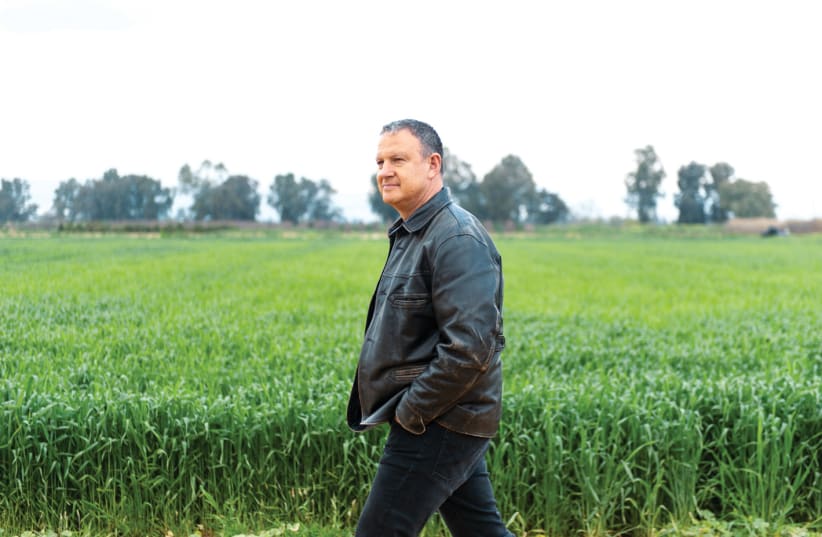“Today, we are leading the way in innovation and investment in foodtech, climate tech, and agricultural technologies that are changing the world, combating the challenge of food security, and helping conserve resources for the planet’s sake.” These are the words of Erel Margalit, Founder and Executive Chairman, of JVP and Margalit Startup City, in a pre-Shavuot interview held with this writer.
“Shavuot celebrates the Biblical food innovation revolution,” says Margalit, sitting in the offices of JVP, not far from the fields where Ruth met Boaz, the heroes of the Book of Ruth that is read on the festival. “From setting aside a corner of the field to leaving the forgotten bundles, the Biblical approach to the harvest incorporated some very modern understandings.”
The challenge of food security, the need to make food production sustainable for the world’s growing population, and its impact on the environment has long been a target that combines profitable investment with genuine social responsibility.
Margalit points to the importance of excellence in this area, not only as part of Israel’s contribution to the world but also to the country’s national resilience. He recalls, “In 1948, David Ben Gurion, Israel’s first prime minister, said that in order to survive, we had to be as strong as the seven countries around us, and the only way to do it, in addition to our courage, would be through technology.”
Margalit attributes Israel’s hi-tech success to several factors. For many years, he says, the country was prized for its technological prowess, but it did not become sufficiently business-oriented until the 1970s, when companies such as Motorola and Intel arrived in Israel, bringing American corporate culture to Israeli technology. Next came venture capital, “and that was the match that lit the spark of hi-tech.” The influx of venture capital helped young Israelis build companies and created revolutions in communication and enterprise software. “When the world of telecom changed to data and then to video,” says Margalit, “Israel was instrumental in bringing about the technology that helped change world networks into a data video network.”
The second phase of Israel’s tech maturation began in 2001 after 9/11, with the advent of Israeli cybersecurity and artificial intelligence technology. “Cybersecurity and artificial intelligence have been the key to unlocking many vertical industry challenges,” says Margalit. “They are changing insurance, banking, enterprise, the automotive industry, food tech and agritech.”
The next phase of Israel’s technological evolution, Margalit notes, must be more inclusive, both demographically and geographically.
Margalit discusses his work in the periphery, including a groundbreaking international Foodtech Center in the Galilee, saying that it has the potential to become a world leader. In today’s hyper-connected world, it can affect change beyond its immediate area. “Our role is bigger than changing the Galilee,” says Margalit. “This revolution can be performed in the Galilee with Amsterdam as a partner, with Cornell University as a partner, and with a variety of places in Asia that can be partners.”
Margalit notes that Israel must include more parts of its population in its development. “If the Galilee is hungry to succeed,” he says, “let them take foodtech and agritech and make it an innovation center with between 30,000 and 40,000 jobs.” The area will need more than jobs: it will require culture, creativity and high-quality education.
In Margalit’s view, Israel needs to create seven new regions of excellence – the eastern and western Negev, the Gaza envelope, the eastern and western Galilee region, Eilat and the Arava. He foresees an increase in hi-tech employment from the Haredi and Arab sectors, but he says that a joint public-private policy is needed to move it forward. “I think it will happen, but the government can make it happen faster. We need incentives, education, and rewards for individuals and companies that will make some of the first moves.”
An Israeli tech scene that is not limited to Tel Aviv and Jerusalem will be primed to play a major role in the coming years in foodtech, agritech, health care and climate tech. Speaking of the need to change the world through food tech, Margalit says, “We cannot continue to eat the way we do if the planet is going to survive.”
Returning to Shavuot and the importance of the climate and environment, Margalit says that the term ‘climate technology’ can apply to a host of different technology areas, including fintech, cyber, foodtech and health care. “Technology can come from a variety of sources for changing the climate and saving the planet,” says Margalit. “Israel can play a major role, but it needs to be redefined not only in terms of the core identified technologies that affect climate change, but also other technologies.”
JVP will continue to maintain its major presence in Margalit Startup City innovation center in New York and its headquarters in Jerusalem. It has created new opportunities in Israel, including 18 companies in Beersheva, its Galilee Food Tech Center, its Haifa center for Health Care IT, and its fintech and AI centers in Tel Aviv. “I see JVP as continuing to thrive, with centers of excellence in Israel, international centers and allowing Israeli hi-tech to identify and serve the big ideas needed to change the world in the next twenty years.”
Looking at the Jerusalem hills from his window, Margalit concludes, “When Boaz saw Ruth in the field, he was part of a revolution in food innovation. We have come a long way, but we have ways to go.”
This article is taken from The Jerusalem Post Israel Technology and Innovation Magazine 2022. To read the entire magazine, click here.
This article was written in cooperation with Erel Margalit
